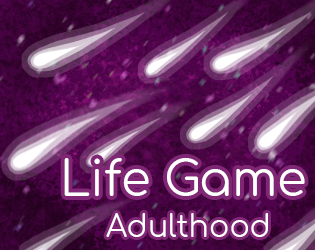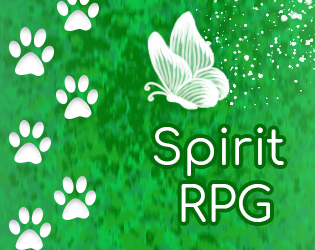Note: We’re going to talk in depth about our thoughts while designing this game, which will likely affect your experience of it. We highly recommend playing it first if you have any inclination to do so: Life Game – Adulthood (itch.io)
What is the game about?
Life Game: Adulthood is a text-based scheduling game representing your full adult life. As an adult, time moves differently, so you can only choose one activity to focus on per quarter, such as angling for a raise, learning an instrument or spending time with friends. Alongside your planned efforts are random events to react to – will you take that job in another country? Donate to the charity that comes knocking on your door? Each choice you make will improve skills, manage your happiness or income, and lead to an entirely different life.

Your skills are athleticism, artistic talent, communication, experimentation and logic, and combinations of these are used to determine your chances of getting certain work offers. In the full version of Life Game, your starting skills would be determined by your Teenage magic levels, but here players can choose their two highest stats. You can keep track of these on the left side of the screen, where they will be joined by major additions to your life, like having a partner, pet or illness. The game continues much the same way, with four actions per year, until your character dies.
The core of Adulthood is randomness. Randomly chosen events pepper your experience, some based on the specifics of your life, such as your age or location. There is also randomness in what your character decides to do – as a player, you can select ‘learn a programming language’ or ‘pick up a crafty hobby’, but your character will decide to pursue their chosen language or craft.

This prototype was created to see whether a time management sim was a feasible and interesting end to Life Game, while we continued working on the Teenage Years. We spent the least amount of time working on Adulthood, compared to all the others, with Flo using Twine to quickly prototype the idea when she wasn’t working on Teen. Its final version would have been created in Game Maker, so it could work with the other stages, and include more gameplay than choosing an action per quarter – such as sections or mini-games reminiscent of Childhood and Teenage Years.
Goals and Inspirations
Flo: While there are many stat-raising games, I hadn’t played many back in 2016, so I wasn’t inspired by a particular one so much as the idea of them, and how they felt like a good fit for adulthood. Real life is the main inspiration here, with random events I’ve experienced before (be prepared for identity theft and near-misses with a bike!) With 103 jobs on offer, I had to do a little digging and juggling to get them to feel right. Which stats should each require? What will they say when you got an offer to work abroad? (as an example, sports journalists would see: Canal Sport wants more tennis coverage. / Todo Deportes wants more hockey coverage. / The All Sports Channel wants more golf coverage. / The Every Star Channel wants more basketball coverage.)
The Teenage Years give you multiple ways to solve each puzzle, so I wanted there to be multiple ways to increase each skill. If you want to improve your fitness but hate going to the gym, you can make a five-a-side team with your friends, or sign up for a league. You can get better at experimentation by trying out new recipes, taking a STEM course or taking care of your plants. The skills here feel more broad, with more sources and applications.
In the description above, I said the core of Adulthood is randomness – that’s because I think a game with repeating core actions benefits highly from using random events to make your time more memorable. You’re choosing one of 26 different activities, but your character might surprise you with their choices – their passions might be softball and botany, or horror novels and musicals. Events don’t always work out the same way, winning or losing a tournament, or meeting different people. There is also a chance to see a random event at the end of each quarter, although without much development time spent on Adulthood, there are fewer of these than make for a good playthrough.

But those are all matters of time and scope. There is an overarching thing I would have wanted to change: the focus on work and other metrics of progression. In many ways, Destina and I balk against a “set path” in life, at the idea of needing to buy a house, be married or have children at a certain age. I wasn’t consciously trying to tell a “set path” story, but I started Adulthood by implementing jobs to make use of your skills, without thinking of other options (like not having a job at all!) In a similar vein, I implemented dating, but not ending relationships. Your salary generally goes up over time, and savings can balloon because there’s little to spend them on. I understand how this happened, given how quickly we stopped work on Adulthood, and I don’t want to be too hard on myself… But it’s a clear reminder that whatever you spend time on will end up as the core to your game, whether you decided it’s the most important aspect or just thought it was a reasonable starting point!
Des: For those following along from the beginning, it should be no surprise that Adulthood was meant to be the ‘meta’ of the ‘micro – macro – meta’ in Life Game. By stringing together the kinds of contexts and goals set up in Teenage Years, and adding a stat management sim on top, the player might have longer-term goals which nonetheless connected with everything they’ve encountered up to this point. I was pretty busy coding Teenage Years while Flo worked on this, so I only really contributed to the concept of this type of game representing a ‘meta’ layer of life management.
Ultimately, if we had gotten the chance to build this out more, I would have liked more interplay between ‘adulthood’ structure (stat-raising and choices) and the ‘playfulness’ of the previous versions. Learning a new skill might drop you into micro games, certain events might play out a bit like the RPG teenage years for short sections, then bump you back up to the ‘management’ game. This was completely infeasible as our attentions had to go elsewhere, but I still like thinking about disrupting that ‘Once you’re an adult, you can never go back to feeling like a kid again’ idea.

I’m also curious where we would have gone if this had more time to percolate creatively. I often advocate that ‘micro – macro – meta’ doesn’t end at ‘meta’ but actually keeps going (it’s just not often practical to do so in a lot of games), and this lines up with wanting to explore the texture of Adulthood (real and the game) beyond being a decades-long stretch of work/life grind. What other changes in kind or perspective might arise, and how might that make sense in game terms? Years after concepting this, I unsurprisingly have different ideas of what I might explore with this game. And just to get way out ahead of this one, the ‘become a parent’ change in kind is noted, but also not the (only) one I would personally focus on.


